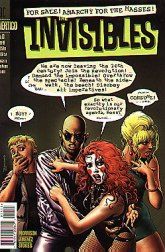|
Summary Characters Analysis |
|
| Annotations o [page 7] [panel 5] The 64-letter alphabet and the 26-letter slave alphabet has a connection with the alphabet demon mentioned by Sir Miles in the Entropy in the U.K. saga (page 7, panel 2), a demon designed to set limits upon abstract thought. [MW] So what makes the "full" alphabet any less evil or restricting than the regular one (which Tom O' Bedlam was also critical of)? Seems to me that it may be fuller, but still ultimately serves the same purpose of tying down abstract notions under cruel grammar. [RD] The language purports not to "describe" things, but to "be" things - which suggests that the reality that could be considered extra-discursive is itself merely a discourse at a higher level. [TEC] o [page 8] [panel 2] Note the UFOs from 1.10 in the upper left. [RD] o [page 9] [panel 1] "I had one of them when I was little" recalls the Barbelith Grey's line, "As a child, we spoke to you through your toys." [RD] panel 2: The mask on the wall, Quimper's but with Robin's make-up. [L] panel 3: Fish and the hologram we call Earth were explained in 2.06. [RD] The small creature looks like the insect in the vision Fanny had at the start of her initiation (1.13, page 18), there were several balls like this floating around Bobby in his crib (1.12), it also explains how come his mother didn't see them. [L] panel 4: The experience of the Invisibles among the "language spirits" appears to support the theory that Quimper and Mason's "alien abduction" share the same source...and that Quimper is some sort of spirit or creature normally associated with children. He could possibly have been twisted and scarred by whatever brought him out into the "real world". Notice also that something among the visions there tipped King Mob off to Quimper's presence in Robin's mind... [DK] o [page 10] [panel 1] Ragged Robin erasing everybody's memory (and the previous panel showing a sort of Quimper-esque face shot) seems a little creepy, not to mention perhaps restrictively unnecessary. As Jack mentions, "But it was all making sense..". [MW] o [page 12] [panel 1] A 'Prisoner' reference. [L] PAGE 13 panel 1: I'm guessing "that" is the Black Train. [RD] o [page 15] Anyone who doesn't know the significance of the number 23 should read Shea & Wilson's Iluminatus! Trilogy. [RD] o [page 17] [panels 1&2] When exactly did "they" get the chance to implant this bug? If they can do it that fast, then who *doesn't* have one? Or does the initiation process screen them out? [RD] o [page 18] [panel 3] Grant is being *very* self-referential this issue, between the autocritiques and the Wilheim Reich reference (Grant is a believer in Reichian therapy). [RD] o [page 19] [panel 1] Oscar/Kadmon's "twenty-minutes into the future" is a phrase that appears in the establishing shot of all six "Max Headroom" episodes; the show feaures the powerful, futuristic Network 23 tv broadcasting company which controls-- and rots-- the minds of it's viewers with its programming. [SD] panel 4: Leo is portrayed as a human being, despite being a murdering monster. See 1.12, and also Lieutenant Lincoln from "Black Science." Note that KM, despite being a supercool groovy assassin, is apparently headed for a messy end, while Dane, who makes a point of sparing his enemies (Sir Miles) becomes Buddha. Herein a moral lies, even if it's only "Live by the gun, die by the gun." [RD] Leo and Bobby (1.12) both wanted to be astronauts. [L] o [page 20] [panel 2] If staring down the Enemy and not pulling the trigger makes one eligible for contact with Barbelith, then how did King Mob get initiated? [MW] panels 4 & 5: No wonder Boy's eyes hurt in part one--she was wearing *two* pairs of contacts... [RD] o [page 21] Barbelith's initial words to Boy are exactly the same as they were for Jack way back in volume 1. [DK] Both Boy and Jack had to be purged of long-held trauma before considered fit for contact with Barbelith. [L] o [page 24] [panel 2] I'm willing to bet anything Oscar is trying to say "I'm talking about the Harlequinade" when King Mob interrupts him. The fact that the Harlequinade (if I am right in thinking Oscar's talking about them) is so interested in/familiar with King Mob may go further to support the theory that Edith is one of/part of them. [DK] "Yes sir, no sir/Three bags full, sir" are lines from The Kinks' "Yes Sir, No Sir" off of their 1969 album "Arthur (or the Decline and Fall of the British Empire)." [JB] This may be a line from a Kinks song, but as far as I know it's just something people say in this kind of context. (i.e. It's an expression I use). I assume it's derived from the children's verse "Bah Bah Black Sheep" Bah Bah Black Sheep, Have you any wool? Yes sir, yes sir, Three bags full. One for the master, And one for the maid, And one for the little boy, Who lives down the lane. [DM] "Yes sir, no sir/Three bags full sir!" is a sort of rakish military flourish for, maybe, "Jawohl!" I don't have a reference, though. So KM mockingly reference hates the idea that he's just another soldier, his "not to reason why?" He should talk, after what he put Dane through early on. [CAG] |
|
| > | |












































